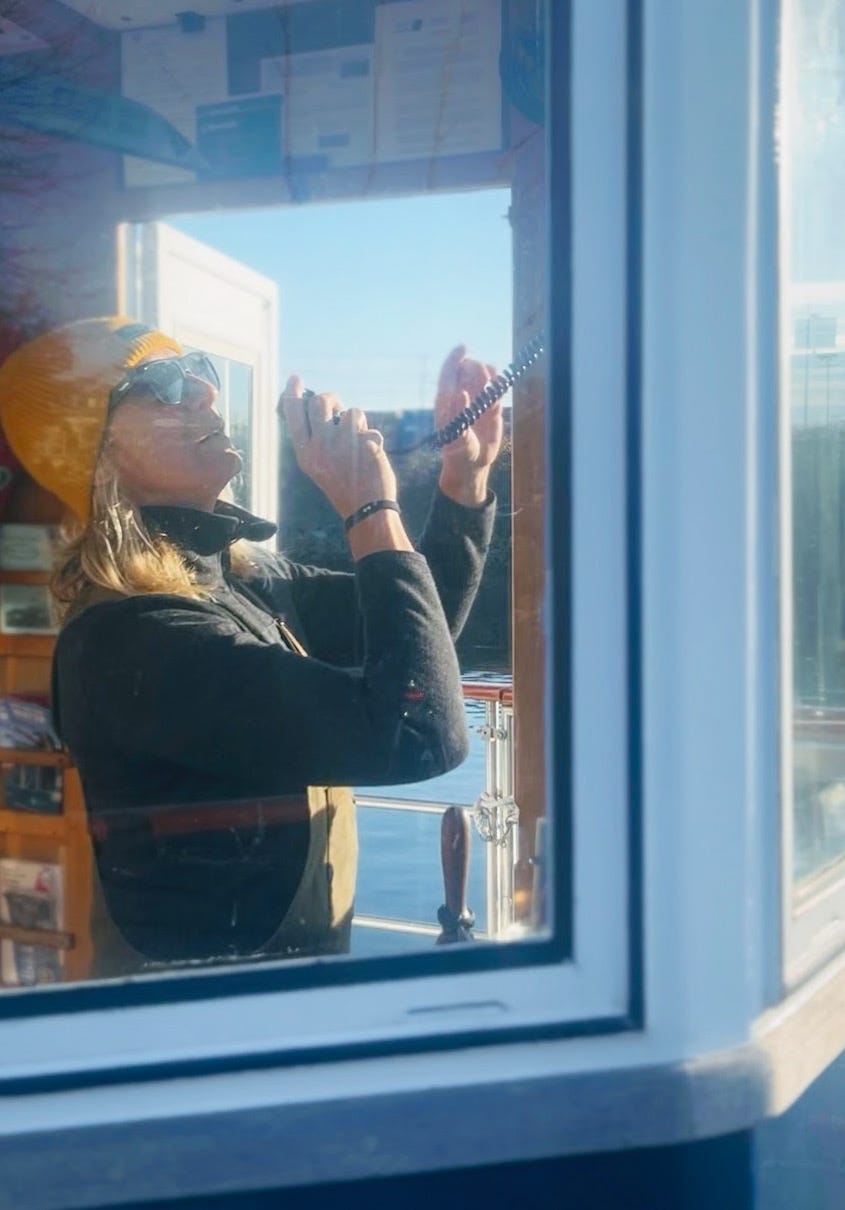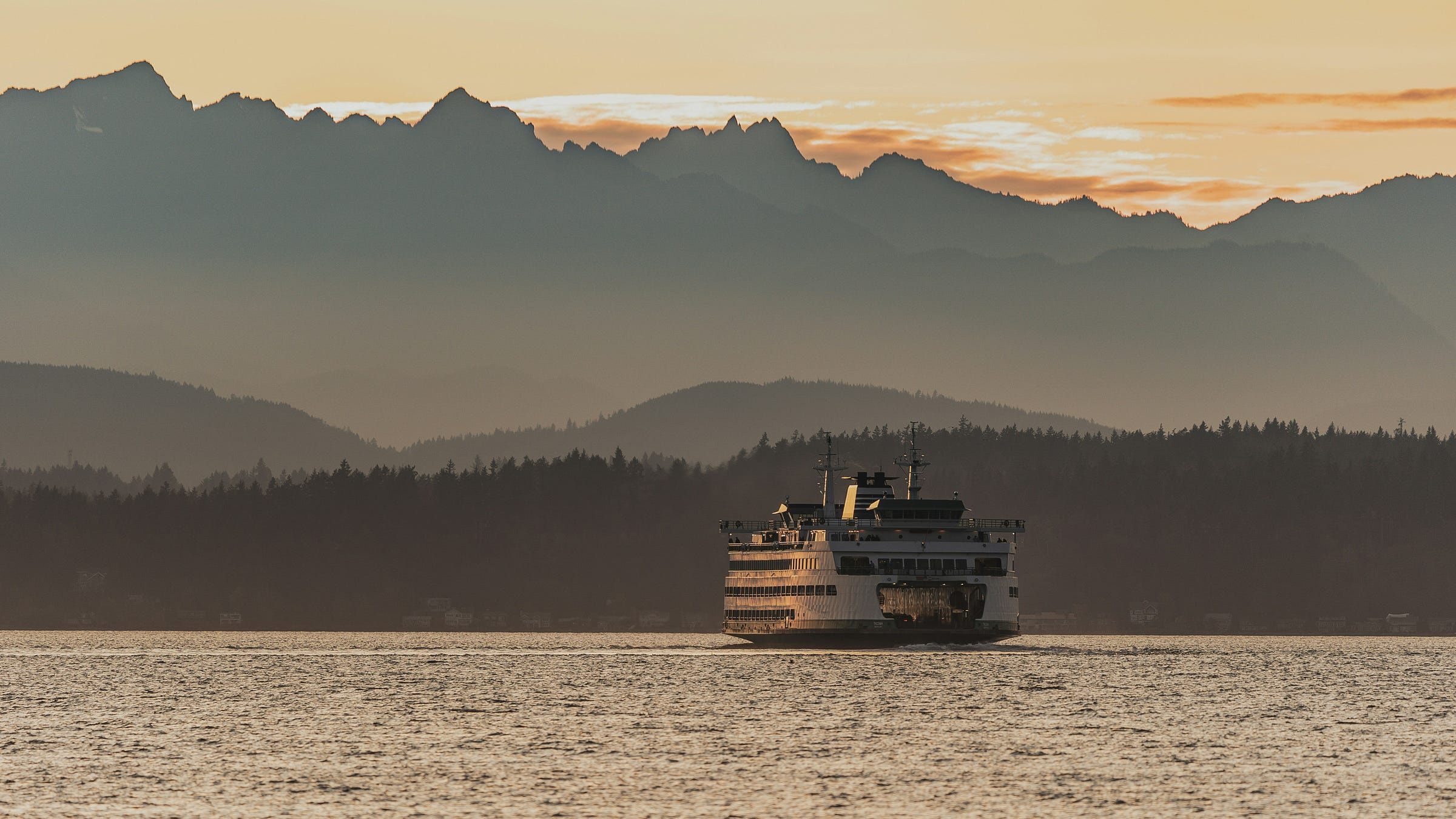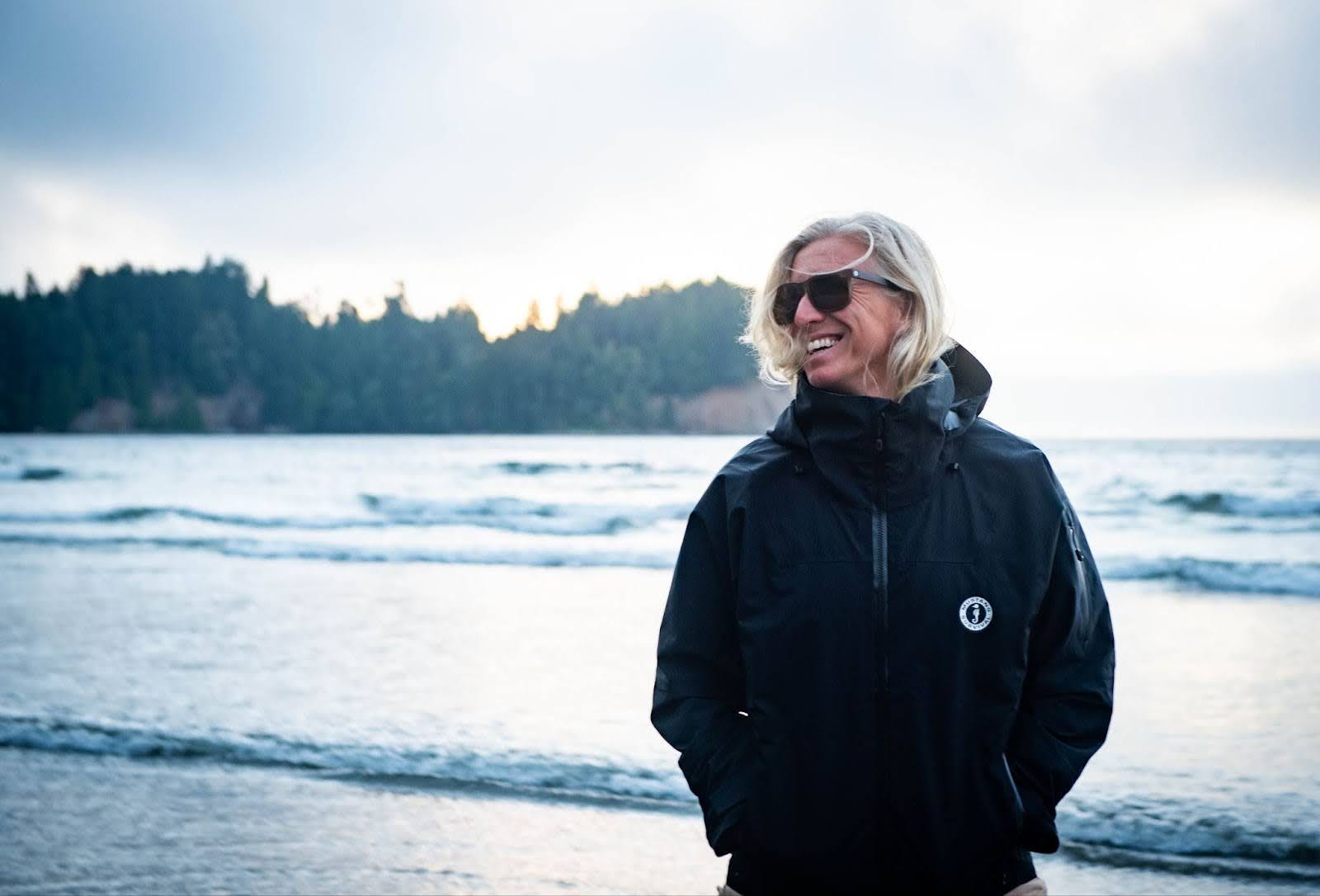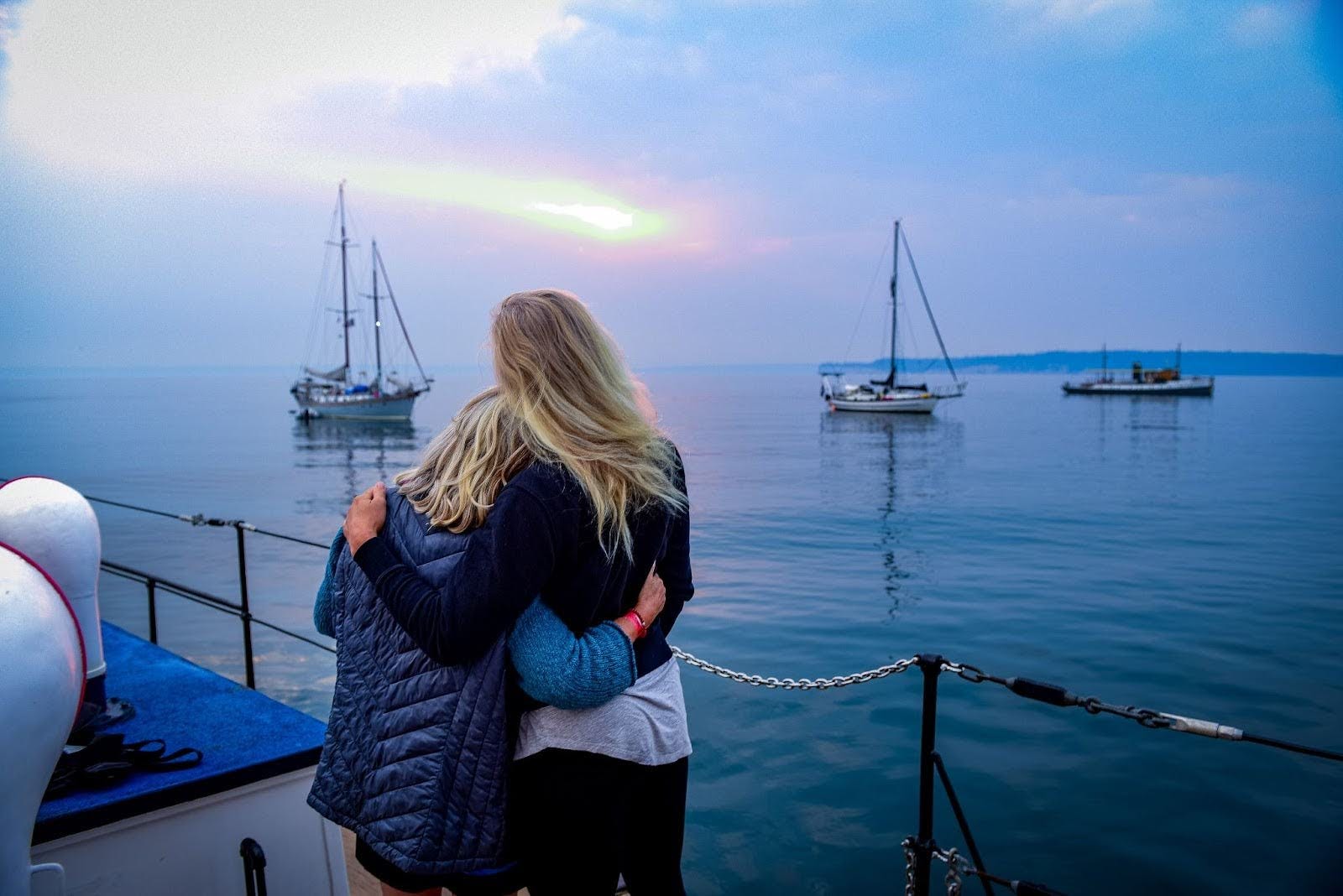Introducing "Pathway to Pilothouse"
A Monthly Chronicle of One Woman’s Journey to the Helm of a Washington State Ferry
On August 23rd, 2023—just over a year and a half ago—I published my first piece on this Substack. It was an interview with one of the founders of Blue River Table, a woman-led boat restoration project and bespoke floating dining experience moored along the quiet coves of Cornwall, England.
That conversation marked the beginning of a larger pursuit—my attempt to map the often-overlooked presence of women+ shaping the modern marine world. What began as a single profile unfolded into a wider investigation—one that traced how women are not only carving out space in a historically male-dominated industry, but also they are challenging its entrenched hierarchies and reshaping not just how the work gets done, but who gets to do it.
This project—and every story that’s followed—was made possible by the Thomas J. Watson Fellowship, which granted me a rare and generous opportunity: one uninterrupted year to travel around the world, observe, and write, with no deliverables but the ones I set for myself.
A unicorn of a fellowship, I’m aware.
The opportunity came to a close in August of 2024. Since then, I’ve returned to the United States—and to a surprising, if sobering, realization: the same themes I followed across oceans, the same communal challenges I encountered, and the same systemic gaps I witnessed abroad are all very much present here, in the very environment I grew up in.
Though my research once spanned continents, it now brings me closer to home. The writing continues—only now, the leaders I interview and the boats I board are often just a car ride away, not a 14-hour flight.
In many ways, the fellowship shaped the international backbone of this platform. The early stories came from shipyards in England, fishing cooperatives in Costa Rica, and commercial ports in New Zealand. But since returning, I’ve been lucky to meet a new generation of maritime leaders—especially in my home state of Washington—who are doing equally vital work.
As this publication has grown, so has its audience. At the time of this writing, a large portion of my readers are based in the U.S.—many with direct ties to our country’s major ferry systems, from the Puget Sound to San Francisco Bay to the Hudson River.
The geography may have shifted. But the questions—and the women doing remarkable things on the water—remain constant.
That’s why I’m incredibly excited to introduce this platform’s first guest columnist—a new initiative that will chronicle the day-to-day realities, challenges, and triumphs of becoming a Washington State ferry Captain, told firsthand by a woman navigating this historically male-dominated field.
In 2025, Washington-based journalist MaryRose Denton reported that only five out of approximately 170 captains in the Washington State Ferry system are women—a figure that amounts to roughly 3 percent. This stark imbalance underscores the urgent need for a closer examination of the barriers preventing women from reaching the pilothouse. And what better way to explore this issue than through the perspective of someone beginning that journey from the ground up?
Especially as the Washington State Ferry system—and the marine industry at large—faces a looming labor shortage, the recruitment and retention of women—who make up 51 percent of the U.S. population and represent a largely untapped segment of the maritime workforce—becomes crucial. In November 2024, the Transportation Trades Department estimated that “about half of the system's chief engineers will be eligible for retirement within the next three years.” Already, ferries have been canceled or delayed as a result of a labor shortage. These workers are critical to the daily running of Washington’s ferries. How many of them identify as women+?
While Washington State’s ferry system is the largest in the country, my hope is that this column resonates far beyond its terminals.
It’s meant not just for Americans or regular ferry passengers, but for anyone whose life intersects with large vessels—and the public institutions that keep them moving.
Now on to Erica, the author of the new monthly column, Pathway to Pilothouse.
Erica Lichty, founder of SEASTR, a nonprofit expanding inclusive access to maritime activities, was born and raised in the Pacific Northwest, United States. With a boat captain father and designer mother, she naturally blended both worlds—sailing the San Juans Islands and working on design projects.
A graduate of California State University Maritime Academy, Erica worked on oil rigs and supply boats before transitioning to interior yacht design. Over the past 22 years, she has built a career as a self-made interior designer, both for marine and non-marine projects, while staying deeply connected to the Pacific Northwest outdoor community
She currently holds a 100-Ton Master USCG License and has previously been a columnist for 48 North, covering the paddleboard beat. Her resume is extensive—she’s a three-time finisher of the Seventy48 race, a two-day, 70-mile human-powered challenge across the choppy waters of Puget Sound. She made history not once, but three times—as one of the few women competing on stand-up paddleboards, and as the only woman to complete the race on a SUP in 2021, 2022, and 2023.
Her 2021 race was documented in the film Stand Up, where she and her teammate used the funds raised from the event and its various film screenings to support charities that combat domestic abuse.
What may be even more significant than Erica’s impressive career and athletic accomplishments is the personal story that ties her to Washington State Ferries. As a child, she dreamed of becoming a captain—there’s even a journal entry to prove it (see below). Somewhere along the way, that dream was reshaped. Now, at age 47, she’s finding her way back to it. If ever there was a right person for this column, it’s her.

While this introductory column is published under my name, future Pathway to Pilothouse entries will appear under Erica Lichty’s own byline. She plans to share audio vlogs, photography, and reflections from her journey to the pilothouse.
I won’t spoil the rest.
I’ll let Erica take it from here. Thank you, Erica, for sharing and documenting your journey.
Column 01: Returning to the Wheelhouse
A captain’s journey back to sea, rooted in legacy, healing, and the power of advocacy.
By Erica Lichty
I am maritime.
I am but one story of many.
Our region holds volumes—untold stories full of prose, images, poetry… beauty, tragedy, inequality, injustice, and adventure.
I am a captain. A mother. A leader. A fearless advocate. A storyteller.
I am maritime—and so are many others.
If you live in one place long enough, I believe you begin to bond with it on a molecular level. I am a fourth-generation Seattleite. I’ve been on the water since I was a little girl. Though I couldn’t always explain it, I always felt it—the pull of the tide, the knowing of the waves.
In high school, I wrote a diary entry of my dream to become a Washington State Ferry captain—surfing local waters, living in a small apartment, maybe even settling in Langley, my favorite place on Whidbey Island.
I graduated from high school in Seattle and began college at California State University Maritime Academy in Vallejo, California. I entered with unprocessed trauma and walked into an environment that was far from holistic. For many of us—those who didn’t see ourselves reflected in the industry—it was an uphill battle.
I thought my story was unique. I thought I did not belong. Slowly, my dream of navigating the Salish Sea began to fade.
My maritime career was brief after the Academy: a stint on an oil rig, operating crew boats in the Bay Area, and then a sharp turn back to the Northwest into interior yacht design.
Years passed. A marriage, a birth, a divorce. At 40, I found myself asking big, scary questions—and finally acknowledging my deep desire to return to the wheelhouse. I began to articulate that need… and my right to be there.
That act of advocacy—first for myself, then for others—sparked the birth of SEASTR+.
In the last seven years, working in DEI spaces and defending the rights of women+ across all areas of maritime has been deeply healing. I found the holistic maritime environment I was missing all those years ago.
Running a nonprofit as a single parent isn’t sustainable—not for me. And I have been afraid to pursue a full-time maritime career, worried it might come at the cost of SEASTR’s longevity. But with the encouragement of family, friends, and the magic created through this nonprofit’s community, now, I finally feel ready.
So, in January of 2025, I applied to Washington State Ferries—at age 47.

I’m currently in a three-week onboarding process, connecting with my cohort and the officers guiding us through this next chapter.
Back in November 2024, I attended the Maritime Industry Economic Forecast Breakfast with another SEASTR leader, Amy Larsen. There, I heard Steve Nevey—Assistant Secretary for Washington State Ferries—speak. It was the morning after a brutal windstorm, and he didn’t have a written speech. He spoke from the heart instead.
What he said hit me so hard I cried.
I stood in line to shake his hand afterward—probably surprised him when I gave him a full-on bear hug. One day, I hope I get to tell him just how much that moment meant. It gave me hope.
It made me proud to take on the challenge of navigating my way to the pilothouse.
“To the young dreamers, the late bloomers, and the tide-drawn souls: there’s a seat for you in the pilothouse, too.”
— Erica Lichty
Sources
Denton, M. (2024, March 28). Women making history aboard the Washington State Ferries. SkagitTalk. https://skagittalk.com/2024/03/28/women-making-history-aboard-the-washington-state-ferries/
Rice, C. (2023, November 28). ‘We’re at a breaking point’: Washington ferry workers demand 20% raise. KUOW. https://www.kuow.org/stories/we-re-at-a-breaking-point-washington-ferry-workers-demand-20-raise
Transportation Trades Department. (n.d.). TTD stands in solidarity with Washington State ferry engineers and oilers.https://ttd.org/policy/policy-statements/ttd-stands-in-solidarity-with-washington-state-ferry-engineers-and-oilers/









Hi Erica! I just read your first three columns, and I hope you know how glad I am that you picked up this journey. So long as you are able to work at WSF, you will bring change.
I have been with WSF for five years, and to see a fellow woman+ sharing my experiences on a journey to the wheelhouse is so refreshing. When you wrote about the experience with an LDO that you wouldn't discuss here but rather file away as how not to lead, that resonated with me so much. For me, it does genuinely feel like I have a 50/50 shot of experiencing a positive community with each crew I experience. But your words remind me that, while it’s unfortunate, thats not the point. Hopefully by showing up and bringing a learning and kind culture to this job, tomorrow the chances might be much higher.
Anyways, I am very thankful to you for sharing and I look forward to reading about your journey.